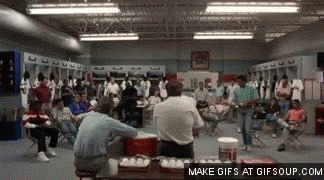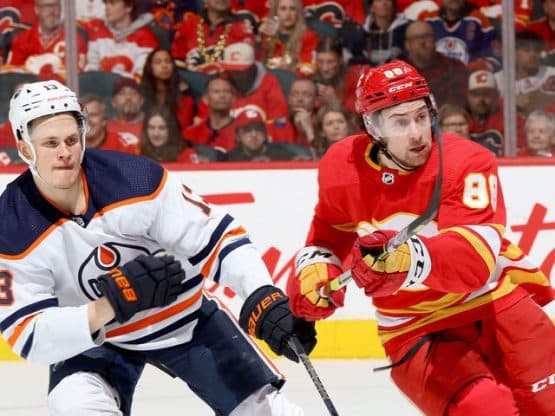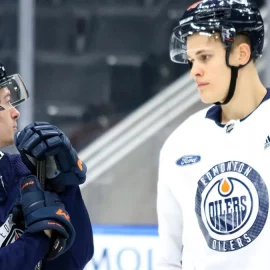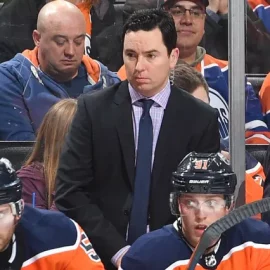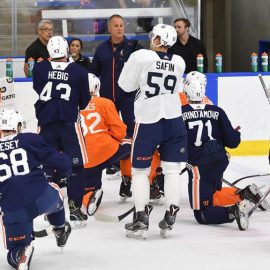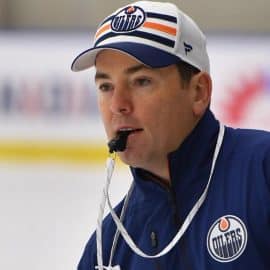The NHL has an image problem. This is not news (In fact, I wrote about it before), but it seems to be something that we can’t really ignore anymore. In the last year, details of a number of instances of domestic violence or sexual abuse involving NHL players have been made public. Obviously there have been more incidents than have been reported (both past and present), and it would be naive to think that they won’t happen again.
The most recent incident involves Buffalo Sabres player Evander Kane. At a Buffalo nightclub in June, Kane allegedly grabbed two women around the neck, pulled the hair of another, and threatened to fight a bouncer at the club. Details of the alleged assaults can be found in documents obtained by WBKW in Buffalo. Whether Kane is found guilty of the charges against him, it’s clear that there’s a pattern of behaviour that is becoming more normalized amongst some (though definitely not all) NHL players. After the league’s botched handling of Patrick Kane’s legal issue (since dismissed due to lack of evidence), it’s not surprising that there is some criticism with respect to the NHL’s responses to these kinds of incidents: as long as off-ice behaviour doesn’t affect on-ice play, the league appears to have a very laissez-faire policy with respect to domestic violence and sexual abuse issues.
Why It Matters
As we look at the athletes we’ve chosen to support it is abundantly clear that most of them are fine, upstanding men. For the most part, we don’t hear about NHL players away from the ice, and for some reason I find that comforting. What is clear, though, is that when an NHL player is in the spotlight away from the ice, it’s not often good news. The underlying problem with the NHL ignoring these issues is not that some of its players have done wrong, but that in avoiding doling out any punishment the league is complicit in the ‘boys will be boys’ mentality that underscores so much of contemporary social interaction.
Domestic violence and sexual abuse situations are rarely isolated and while what has been reported may not seem to be a big deal, there is a connection between gendered microaggressions and later instances of gendered violence, sexual or not. As a female hockey fan, I find it hard to sit back and accept that this behaviour is normal, and I won’t allow the league to sweep the behaviour of some of its stars under the rug. I don’t think that it is too much for me to ask that the people employed by my favourite team (in any capacity) haven’t been in trouble with the law with respect to domestic violence and sexual abuse issues. The language used to brush aside some of these incidents is damaging: just as one does not accidentally drive while intoxicated and crash into a donut shop, one does not accidentally grab someone by the throat or mistakenly force their hand in front of someone’s face, demanding a kiss.
What You Can Do
To that end, Melissa Geschwind created a petition in January that aims to show league officials that NHL fans do, in fact, care how their teams (and, by extension, the league) respond to domestic violence and sexual abuse allegations involving NHL players. With a goal of 50,000 signatures, the petition is still shy of that, but Melissa has moved on to phase two. She is asking that fans of any NHL team pen a quick letter to their team (the deadline is Friday, July 29) and send it to [email protected], where she will compile all the letters she receives and present them to the teams and the league. From the most recent update:
Let your team know that you will not cheer for abusers, that female fans are every bit as important as male ones, that the team has an obligation to be a positive force in its community. In your own words tell your team how it – and the league it belongs to – can and must be better.
While it doesn’t often seem like legitimate fan concerns are ever addressed by teams, this issue has some traction. It’s hard to cheer for a team (and a league) that tends to sweep violence against women under the rug and pretend that it doesn’t exist. Patrick Kane, for all of his on-ice ability, doesn’t seem to be the kind of role model that I’d want my own kids to have. I realize that there’s nothing that says that professional athletes have an obligation to be role models, but organizations should absolutely take it upon themselves to ensure that their employees are upholding a code of conduct befitting decent human beings.
Add The Sports Daily to your Google News Feed!
